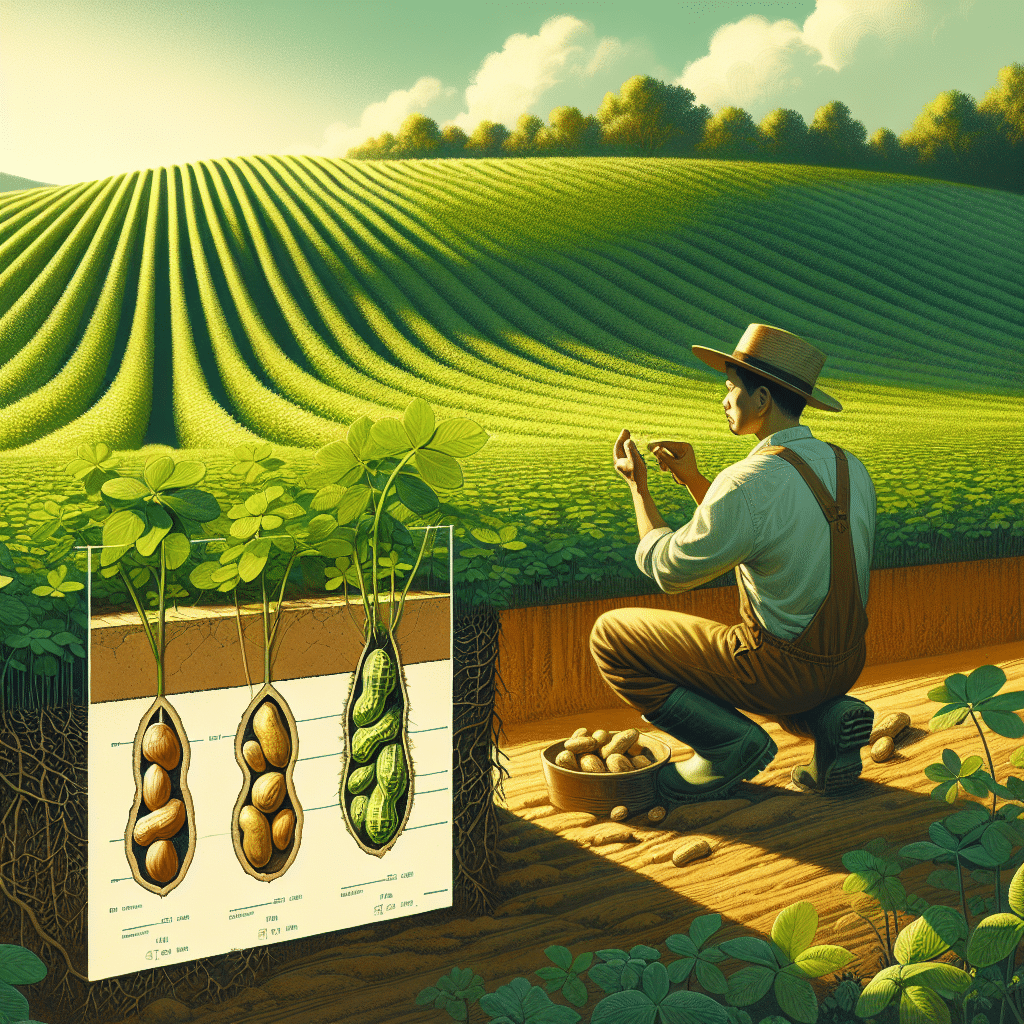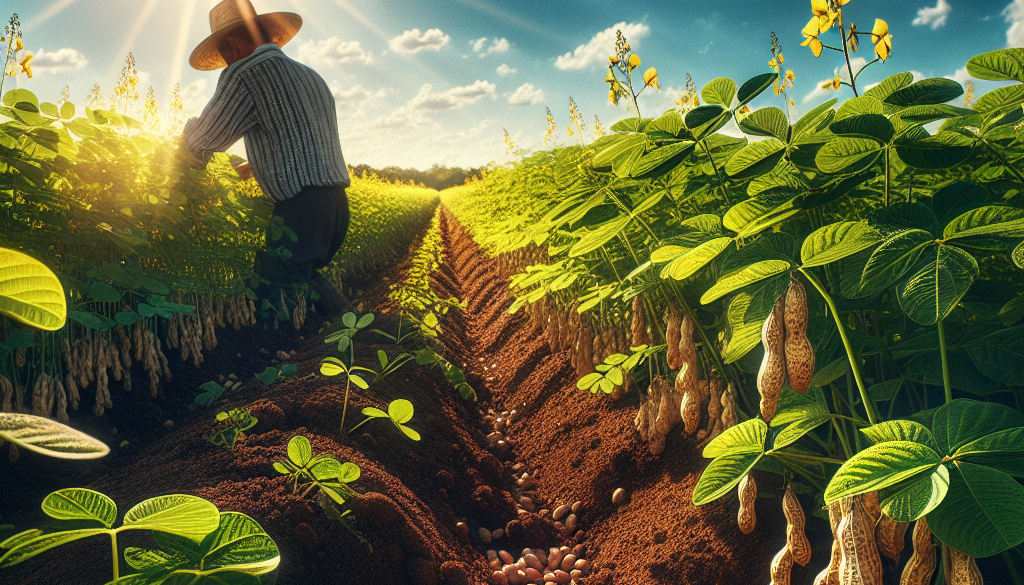Where Do Peanut Grow: Unveiling The Nutty Grounds
-
Table of Contents
- Peanut Cultivation Explored: Discovering the Nutty Grounds
- The Botanical Background of Peanuts
- Global Hotspots for Peanut Production
- The Lifecycle of a Peanut Plant
- Harvesting and Processing: From Soil to Shelf
- Economic and Nutritional Significance of Peanuts
- Challenges in Peanut Cultivation
- Case Studies: Success Stories in Peanut Farming
- Conclusion: The Future of Peanut Cultivation
- Discover ETprotein’s Premium Plant Proteins
Peanut Cultivation Explored: Discovering the Nutty Grounds

Peanuts, also known as groundnuts, are a staple in diets around the world, revered for their rich flavor and high nutritional value. But where do these versatile legumes originate, and how are they cultivated? This article delves into the fascinating world of peanut agriculture, exploring the regions where peanuts thrive, the conditions they require, and the impact they have on economies and cultures globally.
The Botanical Background of Peanuts
Contrary to popular belief, peanuts (Arachis hypogaea) are not true nuts but legumes, akin to beans and lentils. Originating in South America, peanuts have a unique growth process where the flowers pollinate above ground and then the peanut pods develop underground, hence the name “groundnut.” This distinctive trait is a result of a process called geocarpy, which ensures the protection and nourishment of the developing seeds.
Global Hotspots for Peanut Production
Peanuts require specific climatic conditions to flourish—warm weather, well-drained soil, and a long growing season. The leading producers of peanuts worldwide include:
- China
- India
- Nigeria
- United States (particularly Georgia, Texas, and Alabama)
- Indonesia
These countries offer the ideal conditions for peanut cultivation, contributing significantly to the global supply of peanuts.
The Lifecycle of a Peanut Plant
The journey of a peanut from seed to harvest is a fascinating one. It begins with planting the shelled and treated peanut seeds in warm soil. After germination, the plant grows, flowers, and undergoes a fascinating process called “pegging,” where the flower stalk elongates and burrows into the ground to form the peanut pod. The entire lifecycle spans about four to five months, culminating in the harvest season.
Harvesting and Processing: From Soil to Shelf
Harvesting peanuts is a delicate process that involves lifting the plant from the soil and shaking off the excess dirt. The peanuts are then left to dry in the field or are mechanically dried before being processed. Processing involves removing the peanuts from their shells, grading them for quality, and preparing them for various uses such as oil production, roasting, or making peanut butter.
Economic and Nutritional Significance of Peanuts
Peanuts play a crucial role in both the economy and the diet of many regions. Economically, they contribute to the livelihoods of millions of farmers and workers involved in the peanut industry. Nutritionally, peanuts are a powerhouse, packed with protein, healthy fats, vitamins, and minerals. They are an affordable source of nutrition, making them a vital crop for food security in many developing countries.
Challenges in Peanut Cultivation
Despite their importance, peanut farmers face several challenges, including:
- Pests and diseases, such as the groundnut rosette virus and aflatoxin contamination
- Climate change impacts, leading to unpredictable weather patterns
- Market fluctuations and the need for sustainable farming practices
Addressing these challenges is essential for the continued success and sustainability of the peanut industry.
Case Studies: Success Stories in Peanut Farming
Several initiatives have been successful in improving peanut cultivation. For example, in Georgia, USA, research and extension services have helped farmers adopt more efficient irrigation and pest management techniques. In India, farmer cooperatives have increased bargaining power and access to markets, leading to better incomes and livelihoods for peanut farmers.
Conclusion: The Future of Peanut Cultivation
The future of peanut cultivation looks promising with advances in agricultural technology, improved farming practices, and a growing demand for plant-based proteins. As the world continues to recognize the value of peanuts, both as a crop and a nutritional resource, efforts to enhance sustainable production and address challenges will be crucial.
For those interested in incorporating high-quality plant proteins into their products, ETprotein offers a range of options, including peanut protein. Their commitment to non-GMO, allergen-free ingredients makes them an excellent choice for businesses looking to tap into the health-conscious consumer market.
Discover ETprotein’s Premium Plant Proteins
ETprotein stands out as a leading provider of organic bulk vegan protein and plant proteins. Their extensive selection, including peanut protein, is perfect for various applications in the food and beverage industry, sports nutrition, and more. With a focus on quality and customer satisfaction, ETprotein is your go-to source for all your protein needs.
About ETprotein:
ETprotein, a reputable protein Chinese factory manufacturer and supplier, is renowned for producing, stocking, exporting, and delivering the highest quality organic bulk vegan protein and plant proteins. They include Organic rice protein, clear rice protein, pea protein, clear pea protein, pumpkin seed protein, sunflower seed protein, mung bean protein, peanut protein etc. Their offerings, characterized by a neutral taste, non-GMO, allergen-free attributes, cater to a diverse range of industries. They serve nutraceutical, pharmaceutical, cosmeceutical, veterinary, as well as food and beverage finished product distributors, traders, and manufacturers across Europe, USA, Canada, Australia, Thailand, Japan, Korea, Brazil, and Chile, among others.
ETprotein specialization includes exporting and delivering tailor-made protein powder and finished nutritional supplements. Their extensive product range covers sectors like Food and Beverage, Sports Nutrition, Weight Management, Dietary Supplements, Health and Wellness Products, and Infant Formula, ensuring comprehensive solutions to meet all your protein needs.
As a trusted company by leading global food and beverage brands and Fortune 500 companies, ETprotein reinforces China’s reputation in the global arena. For more information or to sample their products, please contact them and email sales(at)ETprotein.com today.














